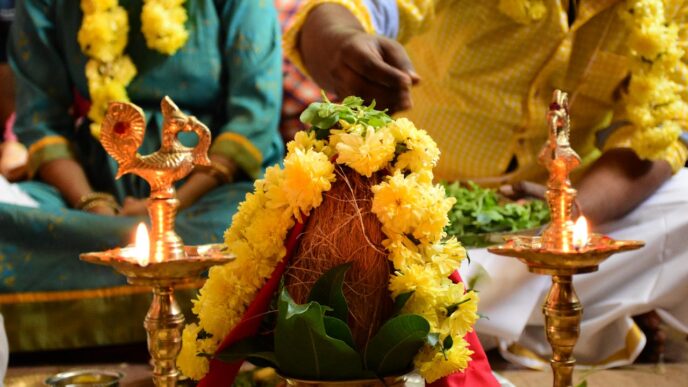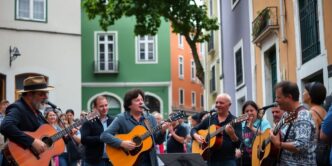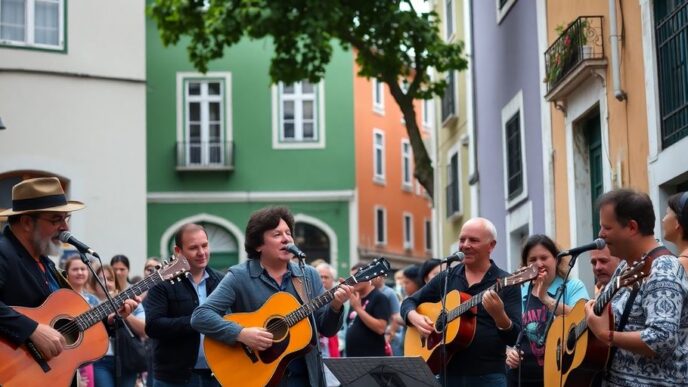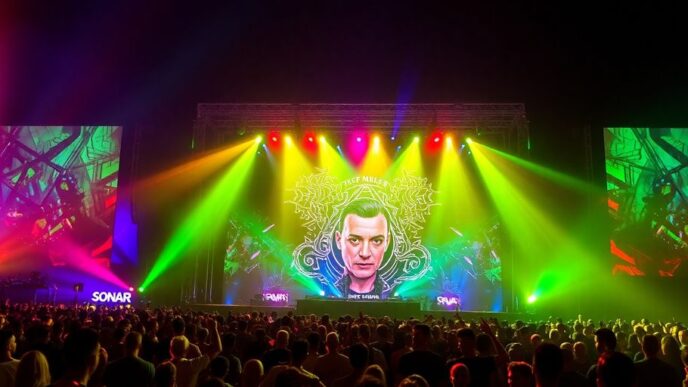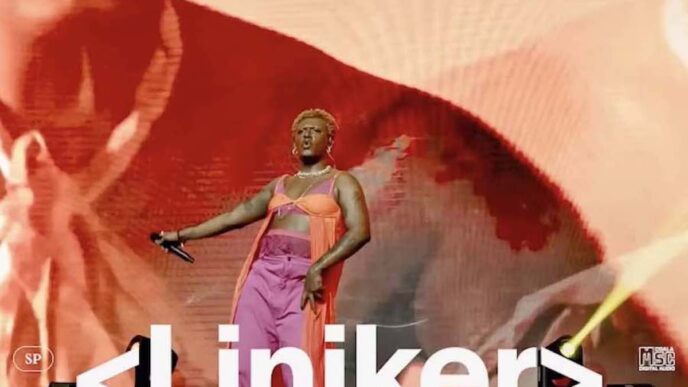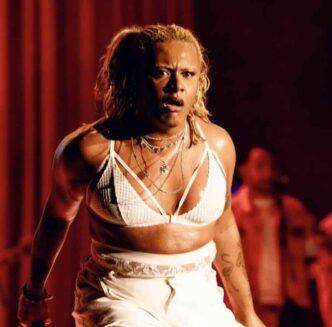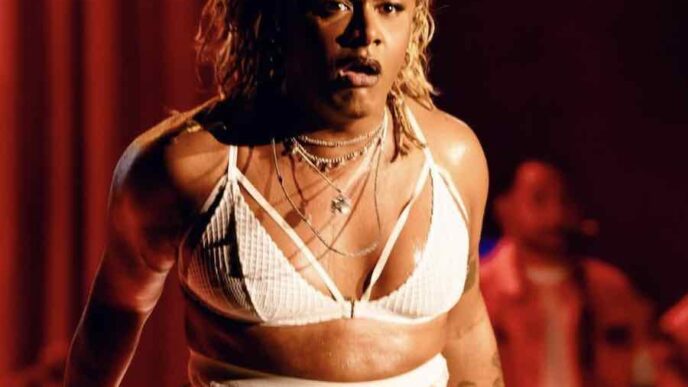Portugal’s music scene extends far beyond the melancholic sounds of fado. Although fado is cherished worldwide as the soul of Portuguese music, the country’s sonic landscape is diverse and full of unique genres and styles. From vibrant folk traditions to modern electronic beats, Portuguese music reflects the history, culture, and evolving tastes of its people. Let’s take a closer look at some of Portugal’s most captivating genres and their celebrated artists.
1. Pimba: Portugal’s Upbeat Pop-Folk Sound
One of Portugal’s most energetic genres, Pimba music is playful and upbeat, known for its catchy melodies and often humorous lyrics. It’s a genre that doesn’t take itself too seriously, with lighthearted themes that are easy to sing along with at festivals and gatherings. Quim Barreiros, known for his accordion skills and humorous storytelling, is one of the most iconic figures in Pimba. His song “A Garagem da Vizinha” is a classic of the genre, along with tracks by artists like Emanuel and Ágata, both of whom bring a lively vibe to their performances. Pimba music is widely beloved across generations and continues to be a staple in Portuguese celebrations.
2. Portuguese Rock and Pop: An Evolving Scene
The rock and pop scene in Portugal has a vibrant history, influenced by global trends yet distinctively Portuguese. Xutos & Pontapés are rock legends, often considered Portugal’s answer to the Rolling Stones, with hits like “Contentores” that have become rock anthems.
Another highly regarded artist, Rui Veloso, often referred to as the “father of Portuguese rock,” introduced a bluesy touch to the genre. His iconic song “Porto Covo” captures the heart of Portuguese storytelling, blending heartfelt lyrics with classic rock rhythms. Other notable acts like The Gift continue to evolve Portuguese rock and pop, infusing their music with international influences while remaining deeply rooted in Portuguese culture.
Hailing from the small Algarve village of Fuseta, Domingos Caetano is the lead vocalist and guitarist with Iris, a prog-rock band who were founded in 1979. Caetano returned to Fuseta some years ago, and runs a music school there, and brings his students to a local bar O Farol, every Wednesday night to play to the delight of locals, and visitors, all of whom refer to him as The Professor.
The band’s lineup has evolved over the years, with Caetano remaining as the consistent member, serving as the lead vocalist and guitarist. IRIS achieved national recognition with hits like “Oh Mãe”, Cinderela and “Atira’tó Mar,” the latter being a Portuguese rendition of Bob Dylan’s “Knockin’ on Heaven’s Door.
3. Kizomba and Funaná: Rhythms from Lusophone Africa
Kizomba, originally from Angola, and Funaná, from Cape Verde, have become highly popular genres in Portugal. These danceable, rhythmic styles are now integral parts of Portugal’s music scene, celebrated in clubs and at festivals across the country. Anselmo Ralph, a popular Angolan-Portuguese artist, has made Kizomba a household genre with hits like “Não Me Toca.” Nelson Freitas, known for his smooth blend of R&B and Kizomba, has also brought widespread attention to these genres. These sounds reflect Portugal’s deep cultural connections with its former African colonies, and their growing popularity is a testament to Portugal’s multicultural influences.
4. Hip Hop Tuga: Portugal’s Unique Take on Hip-Hop
Hip Hop Tuga, or Portuguese hip-hop, is a genre that has taken root in Portugal, blending American hip-hop influences with Portuguese language and local stories. Sam the Kid, one of Portugal’s most respected hip-hop artists, is known for his storytelling and introspective lyrics, especially in tracks like “Anti-Herói.” Valete, another prominent figure in the genre, is recognized for his conscious rap style and impactful messages. With artists like Slow J pushing the genre forward, Hip Hop Tuga has become a platform for social commentary and expression, capturing the challenges and triumphs of modern Portuguese life.
5. Traditional Folk and Cante Alentejano: Voices from the Countryside
Portugal’s folk music varies across regions, with each area offering unique sounds and traditions. One particularly beloved style is Cante Alentejano, a polyphonic singing tradition from the Alentejo region. Recognized by UNESCO as part of the Intangible Cultural Heritage of Humanity, Cante Alentejano features soulful harmonies sung by groups called “coros.” Groups like Cantadores de Redondo and Brigada Victor Jara have preserved and promoted this musical heritage. The folk scene in Portugal also includes other regional styles, all of which evoke the rural landscapes, history, and traditions of the Portuguese countryside.
6. Electronic Music and DJs: Global Sounds with a Portuguese Twist
The electronic music scene in Portugal has grown rapidly, with local DJs and producers gaining international recognition. DJ Vibe, one of Portugal’s most acclaimed DJs, is known for his techno and house sets that have made waves both locally and internationally. Branko, formerly of the group Buraka Som Sistema, introduced Kuduro, an Angolan-inspired genre that blends electronic beats with African rhythms, to a global audience.
Moullinex, another influential figure, has put Portugal on the electronic music map with his unique style that combines elements of disco, funk, and house. Portuguese electronic artists continue to bring new sounds to the world, showcasing Portugal’s openness to global musical influences.
7. Portuguese Jazz: Innovation and Soul
Jazz is thriving in Portugal, with a community of musicians bringing new life to the genre. Pianist Mário Laginha and singer Maria João are prominent figures in the Portuguese jazz scene, known for their inventive collaborations and fusion of jazz with world music elements. Carlos Bica, a renowned bassist, has also made significant contributions to Portuguese jazz. His compositions, often infused with folk and classical influences, have earned him a dedicated following. Portuguese jazz is characterized by its creativity and adaptability, as musicians explore new sounds while paying homage to the genre’s roots.
From the rural harmonies of Cante Alentejano to the urban beats of Hip Hop Tuga, Portuguese music is as diverse as the country itself. Each genre not only tells a story of Portugal’s past but also reflects its cultural evolution, creating a rich musical tapestry that’s well worth exploring. Whether you’re drawn to the heartfelt lyrics of fado or the dance rhythms of Kizomba, Portugal offers a musical experience that resonates with history, passion, and modern creativity.



